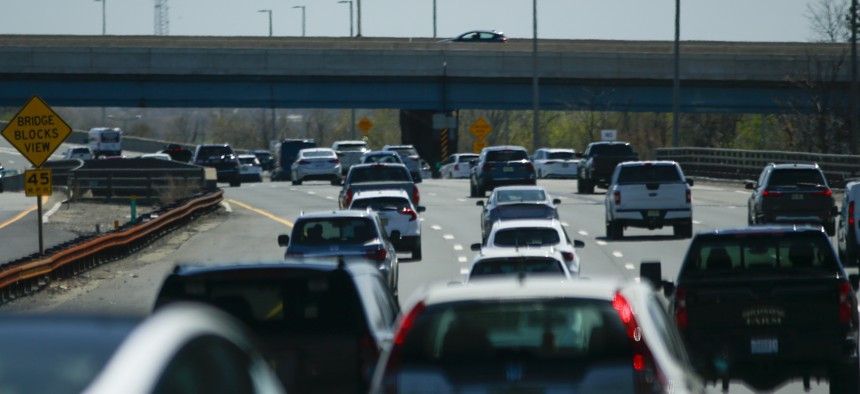White House finalizes rule requiring states to target vehicle pollution

Kena Betancur/VIEWpress via Getty Images
The controversial requirement will almost certainly meet resistance from Republicans both in states and Congress, who question the legal basis for the new rules.
The Biden administration is moving ahead with a controversial proposal to require states and metropolitan planning organizations to track the amount of greenhouse gases produced by their road networks, and to set goals to reduce that pollution.
“Every state has its own unique climate challenges, and every state ought to have the data, funding and flexibility it needs to meet those challenges head on,” U.S. Transportation Secretary Pete Buttigieg said in an announcement. “This new performance measure will provide states with a clear and consistent framework to track carbon pollution and the flexibility to set their own climate targets.”
The Federal Highway Administration announced the final rule Wednesday. FHWA Administrator Shailen Bhatt stressed that the proposal would not penalize states and planning agencies that fall short of their self-imposed targets.
“Transportation is the leading source of greenhouse gas emissions in the U.S. and reducing emissions from that sector while ensuring our economy works for everyday Americans is critical to addressing the climate crisis,” Bhatt said. “We don’t expect state DOTs and MPOs to solve a problem this large on their own, which is why this performance measure does not impose penalties for those who miss their targets.”
The administration formally announced the new rules at a time that officials in Washington and most Americans turned their attention toward the Thanksgiving holiday, likely in an effort to minimize political blowback.
But the new requirements come more than a year after the administration first put forward the proposal. In fact, the proposal is similar to a measure put in place at the end of the Obama administration, which the Trump administration later rescinded.
Republican attorneys general, state transportation departments and members of Congress have questioned the legal basis for the rules.
U.S. Sen. Kevin Cramer, a North Dakota Republican, slammed the new regulations and threatened to lead a congressional effort to repeal them. He said senators considered proposals to include the reporting requirements when they debated the 2021 infrastructure law, but decided not to include “this poison pill.”
“Once again, the Biden bureaucracy is returning to their stale playbook of inventing illegal, punitive regulatory schemes,” Cramer said in a statement. “They clearly have learned nothing from the Supreme Court, which has made clear: the absence of a prohibition is not a license. This final rule is contrary to congressional intent, usurps state authority by putting the federal government in the driver’s seat, and is fundamentally unworkable in rural states like North Dakota.”
Democrats say the rules are necessary to carry out the federal government’s responsibility to monitor the “environmental sustainability” of the highway system.
“American families deserve a cleaner, greener, safer and more accessible transportation system,” said U.S. Rep. Rick Larsen of Washington state and the top Democrat on the House Transportation and Infrastructure Committee. “Measuring and reporting the amount of greenhouse gases coming from vehicles on our roads is a key step in achieving a more sustainable transportation future.”
The FHWA also stressed the importance of keeping tabs on greenhouse gas pollution.
“As a matter of transportation policy, [the U.S. Transportation Department] considers the [greenhouse gas] measure essential to improve transportation sector performance and demonstrate federal leadership in the assessment and disclosure of climate pollution,” the FHWA wrote in its new rule.
“By providing consistent and timely information about on-road mobile source emissions on the [national highway system],” it explained, “the [greenhouse gas] measure has the potential to increase public awareness of [greenhouse gas] emissions trends, improve the transparency of transportation decisions, enhance decision-making at all levels of government and support better informed planning choices to reduce [greenhouse gas] emissions or inform tradeoffs among competing policy choices.”
Daniel C. Vock is a senior reporter for Route Fifty based in Washington, D.C.
NEXT STORY: Ahead of busy Thanksgiving travel, improvements to air transportation touted






